高中英语 人教版必修1 Unit 3 Travel journal 现在进行时课件(共20张PPT)
文档属性
| 名称 | 高中英语 人教版必修1 Unit 3 Travel journal 现在进行时课件(共20张PPT) | 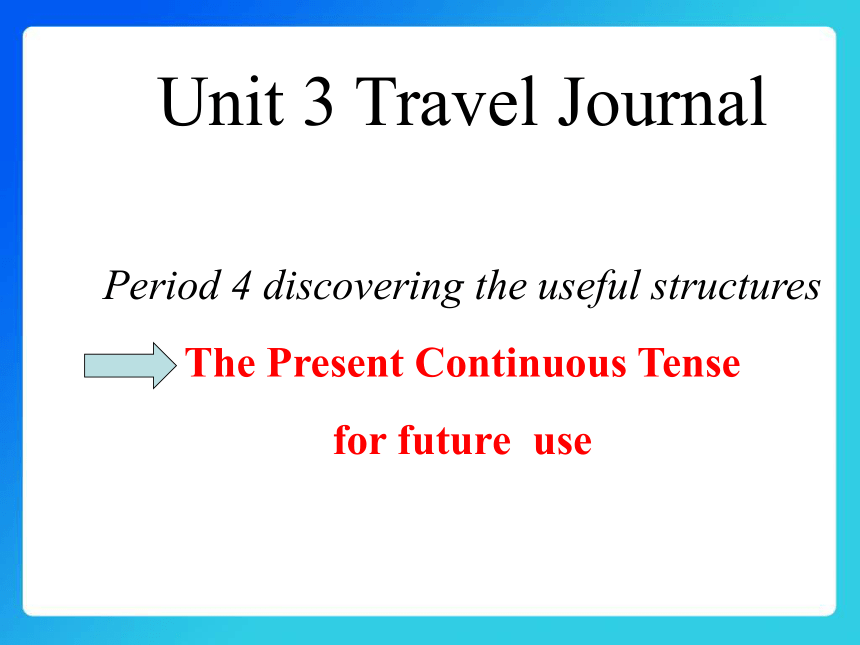 | |
| 格式 | zip | ||
| 文件大小 | 545.8KB | ||
| 资源类型 | 教案 | ||
| 版本资源 | 人教版(新课程标准) | ||
| 科目 | 英语 | ||
| 更新时间 | 2018-12-16 19:09:12 | ||
图片预览


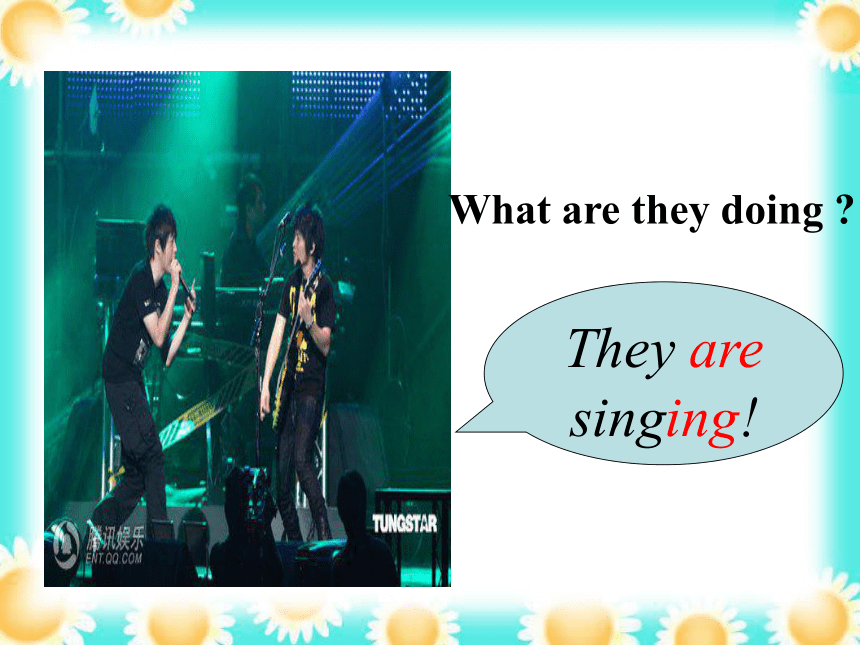
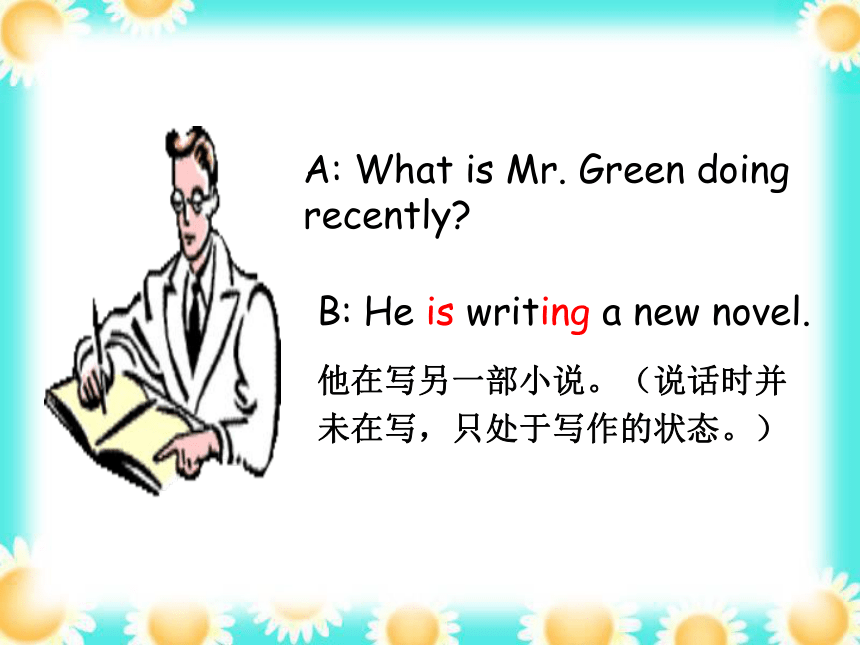


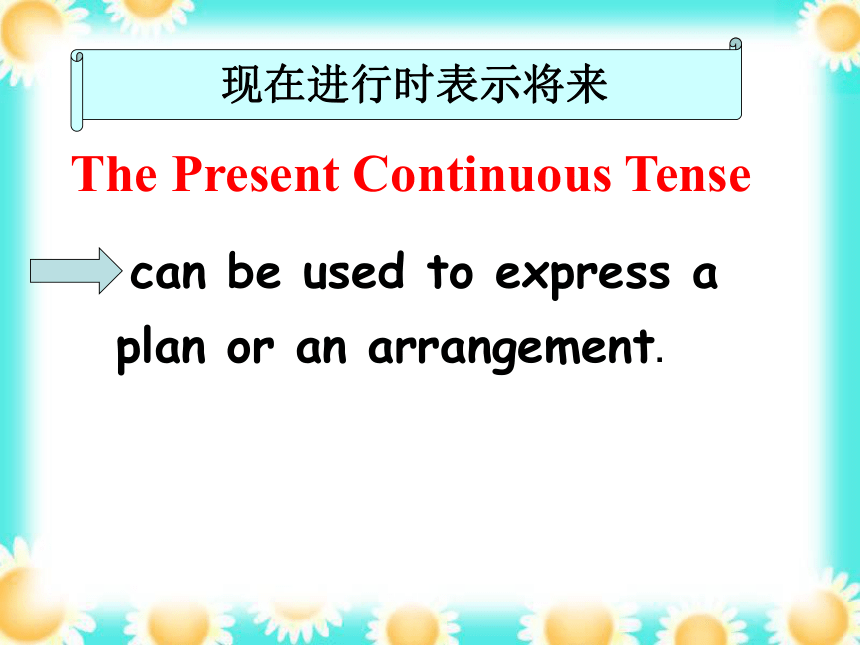

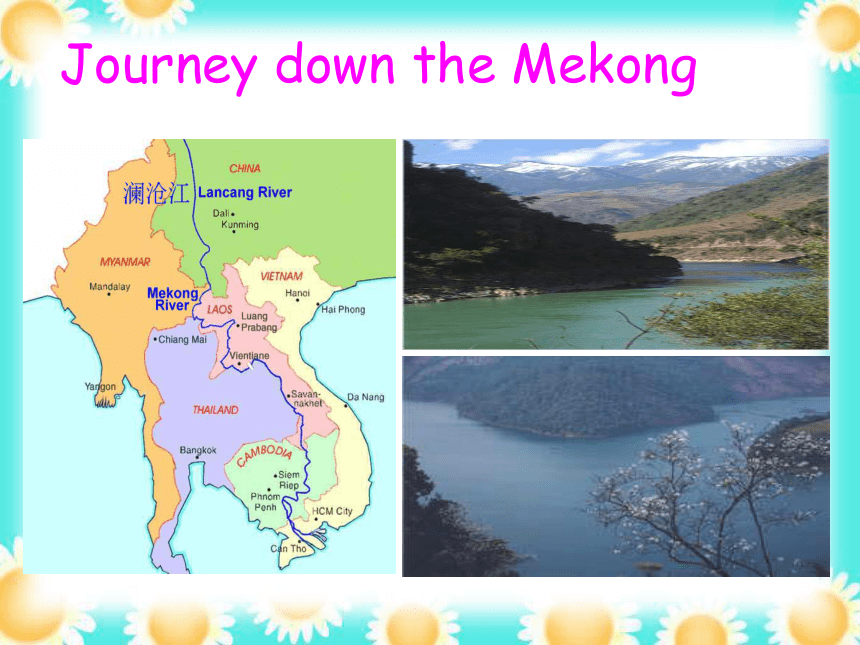
文档简介
课件20张PPT。Unit 3 Travel Journal Period 4 discovering the useful structures
The Present Continuous Tense for future use What is she doing? She is listening to music.They are singing!What are they doing ?A: What is Mr. Green doing recently?B: He is writing a new novel.他在写另一部小说。(说话时并未在写,只处于写作的状态。)
(1) 表示现在的动作:
表示说话时(此时此刻)正在进行的动作,与时间状语now, at the moment,right now等连用。
e.g. The students are doing homework now.
表示现阶段正在进行的动作,而不一定是说话时正在进行的动作,常与today, this week, this term ,recently 等连用。
e.g. He is writing a new novel recently.
review现在进行时 (2)表示反复性或习惯性的动作:
常与副词 always, continually (频繁地)等连用,有强烈的感彩,表示说话人的(褒)赞扬,(贬)厌恶,不满,遗憾等的感彩。
e.g. She’s always changing her mind.
The Present Continuous Tense
can be used to express a plan or an arrangement.
现在进行时表示将来When are you leaving?
= When you leave?
=When you leave?
Where are you staying ?
How are you going to…?
How long are you staying in…?
When are you arriving in/at…?
When are you coming back?Sentence pattern:look back←Warming Up 2 (P17)﹜表将来 aregoing towillJourney down the MekongTask one – pair work Here is another dialogue on page 21. In the dialogue a newspaper reporter is interviewing Wang Wei about her plans for the trip along the Mekong River. However, they are not sure about some of the verb tenses. Can you help them complete their conversation? Sr: Miss Wang, I hear that you along the Mekong River.
That’s really exciting. Have you got everything ready?
Sw: Almost.
Sr: When you ?
Sw: Next Monday.
Sr: How far you each day?
Sw It’s hard to say. If the weather is fine, I think we’ll be able to ride 75 km a day.
Sr: What about the weather in Qinghai Province?
Sw: The weather forecast is not good so we a large parcel of warm clothes with us.
Sr: Where you at night?
Sw: Usually in our tent, but sometimes in the villages along the river bank.
Sr: What happens if you have an accident?
Sw: Don’t worry. I had some medical training at my college.
Besides, we out insurance to cover any problems.
Sr: Well, it sounds fun. I hope you’ll have a pleasant journey. Thank you for your time.are going to travelareleavingarecyclingwill /are going to takearestayingwill take/ are taking用现在进行时表示将来:
(1) 指的是近期的,按计划或安排要发生的动作;常有“意图”“安排”或“打算”的含义;感觉比较生动,给人一种期待感。
(2) 谓语通常为瞬间性的动词(并非所有动词)。
如, come, go, arrive, leave, start, begin, return,meet, stay, play, do, have, take, get to, see off, travel, fly, drive, walk, reach, meet …
I’m leaving tomorrow.
He is coming back this Sunday.
How are you getting there? 我星期五动身去北京。
I’m leaving for Beijing this Friday.
2. 我的朋友今晚过来。
My friends are coming over this evening.
3. 下周五我们乘飞机去上海。
We are flying to Shanghai next Friday.
4. 下课后我们打算在操场踢足球。
After class we are playing football on the playground.leave / gocomeflyplay练一练翻译下列句子。will/shall+动词原形,表示将来某个时间要发生的动作或存在的状态;或表示自然趋势或非主观意志。
e.g.
He will write you a letter next week.
I shall be sixteen years old next month.
② be going to +动词原形,表示“就要……”,“打算……”或将要发生的事。
e.g. We’re not going to have any classes next week.
表示将来的时态还有下列方法: ③ be to+动词原形:表示按计划要发生的事或征求对方意见。
e.g. Are we to go on with this work?
④ be about to+动词原形:表示即将发生的动作,不与表示将来的时间状语连用。
e.g. I was about to go swimming when
my guide shouted at me and told me not to do so. ⑤一般现在时表示将来时
(1) come, go, leave, move, start, return, arrive, begin, stay等动词表示的是航班,轮船等时间表时,用一般现在时表将来。
e.g. The plane takes off at 10:10. That is, it’s leaving in ten minutes.
(2) 用在状语从句中用一般现在时代替将来时。
If you do that again, I’ll hit you.
二、动词填空
I_ (leave)in a minute. I ________(finish)all my work before I ______ (leave).
2. —How long _____ you _____(study)in our country?
?—I _____(plan)to be here for about one more year.
?—I _____(hope)to visit the other parts of your country.
?—What ______ you ______(do)after you ______(leave)here?
?—I ________(return)home and ______(get)a job.
3. I __________(write) the composition tonight.
4. Mary’s birthday is next Monday, her mother ______________
(give)her a present.巩固练习am leavingwill finish leavewillstudyplanhopewilldoleavewill returngetam writingis going to giveSummary Present Continuous Tense for future use.
be doing
Verbs: come, go, arrive, leave, start, begin, return,meet, stay, play, do, have, take, get to, see off, etc.
Revision of the Present Continuous Tense, and the Simple Future Tense.
1.Do Ex 1 and 2 in the Using structures on page 57 -- page 58. You are asked to write your plan for a trip by discussing with your partners.
2.Review The Present Continuous Tense for future use.
Homework Thank you!
(1) 表示现在的动作:
表示说话时(此时此刻)正在进行的动作,与时间状语now, at the moment,right now等连用。
e.g. The students are doing homework now.
表示现阶段正在进行的动作,而不一定是说话时正在进行的动作,常与today, this week, this term ,recently 等连用。
e.g. He is writing a new novel recently.
review现在进行时 (2)表示反复性或习惯性的动作:
常与副词 always, continually (频繁地)等连用,有强烈的感彩,表示说话人的(褒)赞扬,(贬)厌恶,不满,遗憾等的感彩。
e.g. She’s always changing her mind.
The Present Continuous Tense
can be used to express a plan or an arrangement.
现在进行时表示将来When are you leaving?
= When you leave?
=When you leave?
Where are you staying ?
How are you going to…?
How long are you staying in…?
When are you arriving in/at…?
When are you coming back?Sentence pattern:look back←Warming Up 2 (P17)﹜表将来 aregoing towillJourney down the MekongTask one – pair work Here is another dialogue on page 21. In the dialogue a newspaper reporter is interviewing Wang Wei about her plans for the trip along the Mekong River. However, they are not sure about some of the verb tenses. Can you help them complete their conversation? Sr: Miss Wang, I hear that you along the Mekong River.
That’s really exciting. Have you got everything ready?
Sw: Almost.
Sr: When you ?
Sw: Next Monday.
Sr: How far you each day?
Sw It’s hard to say. If the weather is fine, I think we’ll be able to ride 75 km a day.
Sr: What about the weather in Qinghai Province?
Sw: The weather forecast is not good so we a large parcel of warm clothes with us.
Sr: Where you at night?
Sw: Usually in our tent, but sometimes in the villages along the river bank.
Sr: What happens if you have an accident?
Sw: Don’t worry. I had some medical training at my college.
Besides, we out insurance to cover any problems.
Sr: Well, it sounds fun. I hope you’ll have a pleasant journey. Thank you for your time.are going to travelareleavingarecyclingwill /are going to takearestayingwill take/ are taking用现在进行时表示将来:
(1) 指的是近期的,按计划或安排要发生的动作;常有“意图”“安排”或“打算”的含义;感觉比较生动,给人一种期待感。
(2) 谓语通常为瞬间性的动词(并非所有动词)。
如, come, go, arrive, leave, start, begin, return,meet, stay, play, do, have, take, get to, see off, travel, fly, drive, walk, reach, meet …
I’m leaving tomorrow.
He is coming back this Sunday.
How are you getting there? 我星期五动身去北京。
I’m leaving for Beijing this Friday.
2. 我的朋友今晚过来。
My friends are coming over this evening.
3. 下周五我们乘飞机去上海。
We are flying to Shanghai next Friday.
4. 下课后我们打算在操场踢足球。
After class we are playing football on the playground.leave / gocomeflyplay练一练翻译下列句子。will/shall+动词原形,表示将来某个时间要发生的动作或存在的状态;或表示自然趋势或非主观意志。
e.g.
He will write you a letter next week.
I shall be sixteen years old next month.
② be going to +动词原形,表示“就要……”,“打算……”或将要发生的事。
e.g. We’re not going to have any classes next week.
表示将来的时态还有下列方法: ③ be to+动词原形:表示按计划要发生的事或征求对方意见。
e.g. Are we to go on with this work?
④ be about to+动词原形:表示即将发生的动作,不与表示将来的时间状语连用。
e.g. I was about to go swimming when
my guide shouted at me and told me not to do so. ⑤一般现在时表示将来时
(1) come, go, leave, move, start, return, arrive, begin, stay等动词表示的是航班,轮船等时间表时,用一般现在时表将来。
e.g. The plane takes off at 10:10. That is, it’s leaving in ten minutes.
(2) 用在状语从句中用一般现在时代替将来时。
If you do that again, I’ll hit you.
二、动词填空
I_ (leave)in a minute. I ________(finish)all my work before I ______ (leave).
2. —How long _____ you _____(study)in our country?
?—I _____(plan)to be here for about one more year.
?—I _____(hope)to visit the other parts of your country.
?—What ______ you ______(do)after you ______(leave)here?
?—I ________(return)home and ______(get)a job.
3. I __________(write) the composition tonight.
4. Mary’s birthday is next Monday, her mother ______________
(give)her a present.巩固练习am leavingwill finish leavewillstudyplanhopewilldoleavewill returngetam writingis going to giveSummary Present Continuous Tense for future use.
be doing
Verbs: come, go, arrive, leave, start, begin, return,meet, stay, play, do, have, take, get to, see off, etc.
Revision of the Present Continuous Tense, and the Simple Future Tense.
1.Do Ex 1 and 2 in the Using structures on page 57 -- page 58. You are asked to write your plan for a trip by discussing with your partners.
2.Review The Present Continuous Tense for future use.
Homework Thank you!
